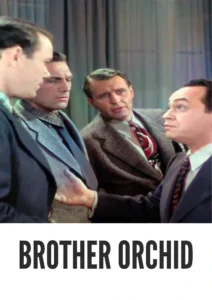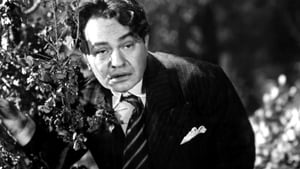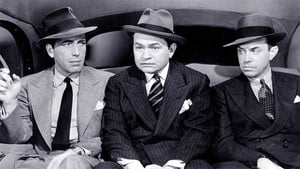Contact: [email protected]
Video Sources 0 Views
- Watch trailer
- Brother Orchid


Synopsis
Table of Contents
ToggleReview: Brother Orchid (1940) – A Charming Blend of Comedy and Crime

Introduction
Brother Orchid, released in 1940, is a delightful blend of comedy and crime directed by Lloyd Bacon. Renowned for its witty dialogue, endearing characters, and clever plot twists, this classic film continues to charm audiences with its timeless humor and infectious energy. In this review, we’ll explore the whimsical world of Brother Orchid and its enduring appeal in the realm of classic cinema.
Check The Full Colorized Movies List
Check Our Colorized Movies Trailer Channel
Understanding Brother Orchid (1940): Director, Cast, and Genre
Directed by Lloyd Bacon, Brother Orchid features a stellar cast led by Edward G. Robinson, Ann Sothern, and Humphrey Bogart. The film belongs to the comedy-crime genre, known for its lighthearted humor, colorful characters, and playful tone.
Exploring the World of Brother Orchid (1940): Plot and Characters
Brother Orchid follows the story of Little John Sarto, a notorious gangster who retreats to a monastery to reassess his life after a failed attempt on his life. Adopting the name Brother Orchid, he finds unexpected solace and purpose among the monks, but his peaceful existence is threatened when his former associates come looking for him. As Brother Orchid navigates the challenges of monastery life while evading his enemies, he discovers that redemption may lie in the most unlikely of places.
The Art of Film Colorization
While Brother Orchid was originally filmed in black and white, its early colorized version adds a new layer of vibrancy to its charming visuals. The colorization process enhances the film’s whimsical atmosphere and captures the nuances of its colorful characters with delightful clarity.
Early Colored Films: A Brief History
The history of early colored films is marked by innovation and experimentation as filmmakers sought to enhance the visual appeal of their movies. From hand-tinted frames to pioneering technicolor processes, the evolution of colorization techniques transformed the cinematic landscape, offering audiences a new way to experience the whimsy and charm of classic comedies.
Brother Orchid (1940) and Its Early Colored Version
The decision to release Brother Orchid in a colorized format was made with the intention of immersing audiences in the film’s vibrant visuals and enhancing its whimsical charm. While some purists may prefer the original black and white version, the early colorized edition of Brother Orchid adds a new layer of vibrancy to its delightful atmosphere and captures the playful spirit of its characters with delightful clarity.
The Debate Over Film Colorization
The debate over film colorization continues to divide audiences and industry professionals alike. While some argue that colorization breathes new life into classic films and makes them more accessible to modern audiences, others maintain that it compromises the artistic integrity of the original work. As technology advances and filmmaking techniques evolve, the debate over colorization remains a topic of ongoing discussion within the film community.
Examining Brother Orchid (1940) as an Early Colored Film
Viewing Brother Orchid in its early colorized iteration offers audiences a fresh perspective on its whimsical visuals and playful tone. The colorization process enhances the film’s charming atmosphere and captures the eccentricities of its characters with delightful clarity. As viewers are drawn into the misadventures of Brother Orchid and his quirky companions, they are treated to a visual feast that immerses them in the delightful world of classic comedy.
Influence and Legacy: Brother Orchid (1940)’s Impact on Cinema
Brother Orchid is widely regarded as a classic of the comedy-crime genre that continues to entertain audiences with its witty humor and endearing characters. Its timeless charm and infectious energy have left an indelible mark on cinema, inspiring countless comedies and capturing the hearts of viewers of all ages.
Director’s Cinematic Legacy: Beyond Brother Orchid (1940)
Lloyd Bacon’s directorial legacy extends far beyond Brother Orchid, encompassing a diverse body of work that includes acclaimed films such as 42nd Street and Footlight Parade. As one of the most versatile filmmakers of his generation, Bacon was known for his ability to craft entertaining narratives that appealed to a wide audience. Brother Orchid stands as a testament to his talent and creativity, solidifying his reputation as one of the great directors of classic Hollywood cinema.
Themes Explored in Brother Orchid (1940)
At its core, Brother Orchid explores themes of redemption, friendship, and the power of second chances. Through its witty humor and endearing characters, the film offers a heartwarming portrayal of personal growth and self-discovery, reminding viewers that even the most unlikely heroes can find redemption in the most unexpected places.
Reception and Controversy Surrounding Brother Orchid (1940)
Upon its release, Brother Orchid received widespread critical acclaim for its witty humor, charming performances, and playful tone. While the decision to release the film in a colorized format sparked debate among purists, its enduring popularity has cemented its status as a timeless classic of the comedy-crime genre.
Where to Watch Brother Orchid (1940) Online
For those eager to experience Brother Orchid for themselves, the film is readily available on popular streaming platforms such as Amazon Prime Video, Google Play Movies, and iTunes. Whether viewed in its original black and white format or its early colorized iteration, Brother Orchid offers a cinematic experience that is both charming and visually stunning.
FAQs About Brother Orchid (1940)
1. Is Brother Orchid based on a true story?
No, Brother Orchid is a fictional film that follows the misadventures of a gangster-turned-monk named Little John Sarto, played by Edward G. Robinson. While the film’s storyline may draw inspiration from real-life events, its characters and plot are works of fiction.
2. Who starred in Brother Orchid?
Brother Orchid stars Edward G. Robinson in the lead role of Little John Sarto, a gangster who finds unexpected redemption in a monastery. He is supported by Ann Sothern, who delivers a delightful performance as Flo Addams, and Humphrey Bogart, who brings his trademark wit to the role of Jack Buck, Sarto’s loyal lieutenant.
3. What is the central message of Brother Orchid?
At its core, Brother Orchid is a heartwarming tale of redemption and friendship. Through its witty humor and endearing characters, the film reminds viewers that even the most unlikely heroes can find redemption in the most unexpected places. It celebrates the power of second chances and the importance of loyalty, friendship, and personal growth.
4. Why was Brother Orchid released in a colorized format?
The decision to release Brother Orchid in a colorized format was made with the intention of immersing audiences in the film’s vibrant visuals and enhancing its whimsical charm. While some purists may prefer the original black and white version, the early colorized edition of Brother Orchid adds a new layer of vibrancy to its delightful atmosphere and captures the playful spirit of its characters with delightful clarity.
5. What is the legacy of Brother Orchid?
Brother Orchid is widely regarded as a classic of the comedy-crime genre that continues to entertain audiences with its witty humor and endearing characters. Its timeless charm and infectious energy have left an indelible mark on cinema, inspiring countless comedies and capturing the hearts of viewers of all ages.
6. Are there any sequels or remakes of Brother Orchid?
No, there have been no official sequels or remakes of Brother Orchid. However, the film’s enduring popularity has inspired countless reinterpretations and homages in various media. Nonetheless, none have captured the whimsical charm and playful spirit of the original 1940 classic.
7. Where can I watch Brother Orchid online?
For those eager to experience Brother Orchid for themselves, the film is readily available on popular streaming platforms such as Amazon Prime Video, Google Play Movies, and iTunes. Whether viewed in its original black and white format or its early colorized iteration, Brother Orchid offers a cinematic experience that is both charming and visually stunning.
Conclusion
In conclusion, Brother Orchid (1940) stands as a delightful blend of comedy and crime that continues to charm audiences with its witty humor, endearing characters, and playful tone. Whether viewed in its original black and white format or its early colorized iteration, Lloyd Bacon’s insightful direction and the stellar performances of the cast offer a cinematic experience that is both charming and visually stunning. As viewers are drawn into the misadventures of Little John Sarto and his quirky companions, they are treated to a whimsical journey that celebrates the power of redemption, friendship, and the joy of second chances. Brother Orchid remains a timeless classic that continues to entertain and inspire audiences around the world.













